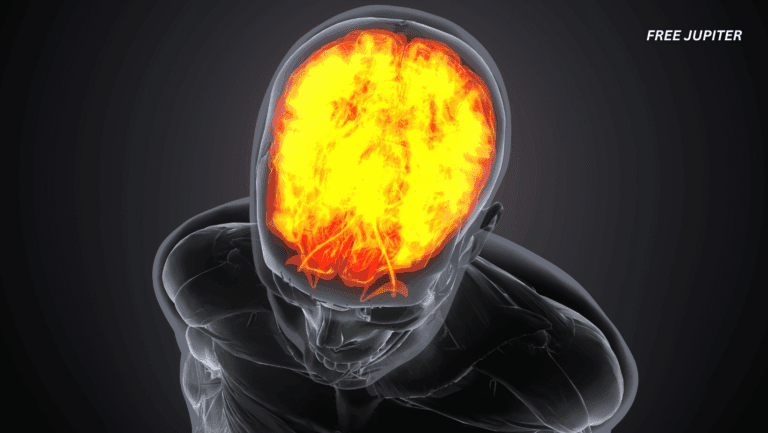Friendly Note: FreeJupiter.com is a place for curious minds and fun discoveries 🌌✨ But we’re a general information site, not a medical guide. Always double-check the facts—and when it comes to your health, check in with a professional too! 💙
When we talk about intelligence or decision-making, most people automatically point to the brain. After all, it’s the command center of our thoughts, emotions, and actions—right? Well, not entirely.
As it turns out, your heart isn’t just a blood-pumping muscle. It has a network of its own neurons—roughly 40,000 of them—that allow it to sense, feel, learn, and remember in a surprisingly brain-like way. This has led scientists to refer to it as the “heart-brain.” And what’s even more surprising? Your heart actually sends more commands to your brain than the other way around.
The Little Brain in Your Heart
The discovery of neurons in the heart wasn’t some recent fringe theory—it’s a well-documented scientific finding that has been explored for decades. In the 1990s, researchers at the HeartMath Institute began studying the heart’s nervous system and its relationship with the brain. What they found was astonishing.
The heart’s neurons form what’s technically called the intrinsic cardiac nervous system. While this network doesn’t do calculus or write poetry, it can sense and respond in complex ways. It can process information independently of the brain, making the heart more like a co-pilot than a mere passenger.
The Heart-Brain Highway
Communication between the heart and the brain happens along the vagus nerve, a major superhighway in the nervous system. But here’s the kicker: up to 90% of the information flowing along this nerve goes from the heart to the brain, not the other way around.
This constant stream of information from the heart influences brain functions—particularly the parts responsible for emotion regulation, attention, memory, and problem-solving.
Think about the last time you felt nervous before a big presentation or excited before a date. Your heart didn’t wait for your brain to tell it what to do—it jumped in first, racing or fluttering before a single conscious thought could explain why. That’s the heart’s neural network kicking into gear.
Read more: There’s a “Second Heart” Located in Your Calves—and It Plays a Crucial Role
Your Emotions Have a Heartbeat
Ever notice how your heartbeat changes when you’re calm vs. when you’re anxious? That’s not just a reaction—it’s a feedback loop. Your emotions can directly impact your heart rhythms, and in turn, your heart’s rhythmic patterns can influence how your brain feels and functions.
In one study published in the Journal of Alternative and Complementary Medicine, researchers found that feelings of appreciation or compassion led to more coherent heart rhythms. These rhythms were then linked to clearer thinking, improved emotional regulation, and even better decision-making.
This is part of what scientists call heart rate variability (HRV)—a key marker of emotional and physical health. A healthy, responsive heart doesn’t beat like a metronome. Instead, it shifts slightly from beat to beat. Greater variability is a good thing—it shows your nervous system is adaptable, and it’s often higher in people who meditate, practice gratitude, or manage stress well.
Real-World Evidence: Listening to the Heart
This connection between heart and brain isn’t just an abstract idea—it plays out in people’s lives in surprising ways.
Take, for instance, the case of heart transplant patients. Some recipients have reported experiencing emotions, cravings, or memories they never had before the transplant—sometimes eerily similar to those of their donors. While anecdotal and still debated, such stories raise fascinating questions about memory and emotional imprinting in the heart.
In one famous case, an 8-year-old girl received a heart from a murdered child. After the surgery, she began having recurring nightmares about the murder. Her descriptions were so vivid and specific that the police were able to use them to help identify the killer. While this remains a controversial story, it adds to the mystery of the heart’s potential role in memory and emotion.
Modern Wisdom Meets Ancient Intuition
The idea that the heart holds intelligence is not new. Cultures around the world have long believed that the heart is more than a pump. From ancient Egyptian texts to Chinese medicine, the heart has been described as a seat of emotion, wisdom, and even the soul.
Even everyday language reflects this belief. We say “follow your heart,” “learn by heart,” or describe someone as “kind-hearted.” These phrases suggest that, deep down, we’ve always suspected the heart has something meaningful to say.
And now, science is finally catching up.
Read more: Scientists Say That The Heart Operates On Its Own Largely Independent of the Brain
What This Means for You: Tuning Into Your Heart’s Wisdom
Knowing that your heart and brain are in constant conversation changes how we think about wellness. It’s not just about physical health or mental health in isolation—it’s about how the two interact. And the heart, as it turns out, is more than just a supporting character. It’s a key player in shaping how you feel, think, and even make decisions.
This means that when your heart is in a state of calm, balance, and coherence, it sends soothing, steady signals to your brain. These signals help the brain regulate emotions more effectively, sharpen focus, improve memory, and support clear thinking. In other words, when your heart is steady, your mind can be steady too.
1. Mindful Breathing: A Simple Reset Button
When you take slow, deep breaths, especially into your belly, it activates the parasympathetic nervous system—your body’s natural relaxation response. This calms your heartbeat, reduces stress hormones, and helps bring the heart into a more coherent rhythm.
Tip: Try inhaling for 5 seconds and exhaling for 5 seconds. Just doing this for a couple of minutes a day can lower anxiety, center your thoughts, and send a wave of calm from your chest to your mind.
2. Meditation: More Than Just Quiet Time
Regular meditation has been shown to strengthen the heart-brain connection, particularly by enhancing heart rate variability (HRV), which is a marker of emotional resilience and cardiovascular health. Even brief meditation sessions—just 10 minutes a day—can help synchronize your heart’s rhythms with brain activity, supporting clearer thinking and better emotional control.
Bonus: People who meditate regularly often report feeling less reactive and more in tune with their intuition—something that may be coming straight from that “heart-brain” connection.
3. Gratitude Journaling: Training Your Heart to Feel Good
Writing down things you’re grateful for doesn’t just make you feel warm and fuzzy inside—it changes your heart’s rhythm. Gratitude is one of the most powerful emotional states for creating heart coherence, which in turn calms the brain’s fear and stress centers.
Over time, this practice can actually retrain your nervous system, helping you stay more centered and optimistic, even when life throws curveballs your way.
Try this: Every night, jot down three things that made you smile, gave you peace, or made your day feel a little brighter. Small things count—like a stranger holding the door or your favorite song playing on shuffle.
4. Listening to Calming Music: Tuning the Heart Like an Instrument
Music doesn’t just affect your ears—it affects your heartbeat. Slow, soothing music—especially pieces with a tempo close to the natural resting heart rate (around 60–70 beats per minute)—can entrain your heart’s rhythm, guiding it into a more peaceful, stable pattern.
This rhythm, in turn, communicates with your brain’s emotional centers, helping you feel more grounded and centered.
Pro tip: Classical, ambient, or nature sounds work wonders. But it really depends on what resonates with you personally—what your heart finds soothing might be unique to you.
5. Emotional Connection: Heartbeats in Harmony
Human beings are wired for connection. When we bond with someone—through a hug, eye contact, shared laughter, or even a heartfelt conversation—our hearts can literally sync up. This is called physiological synchrony, and it’s been observed in mothers and infants, romantic partners, and close friends.
These connections stimulate oxytocin, the so-called “love hormone,” which enhances heart-brain coherence and promotes trust, empathy, and emotional regulation.
So yes, calling a friend when you’re upset isn’t just a social habit—it’s also a biological strategy for getting your heart and mind back on the same page.
Read more: Surgeons Have Achieved The First-Ever Robotic Heart Transplant Without Any Chest Cuts
Final Thoughts: Maybe the Heart Knows Best
So, is your heart smarter than your brain? Maybe not in the traditional sense. But when it comes to emotion, intuition, and inner balance, it may actually have more influence than you think.
Science now confirms what poets and mystics have said all along: the heart is not just a vessel—it’s a voice. One that speaks through rhythm, emotion, and connection. And perhaps it’s time we all started listening a little more closely.
Because sometimes, the heart doesn’t just beat.
It leads.










